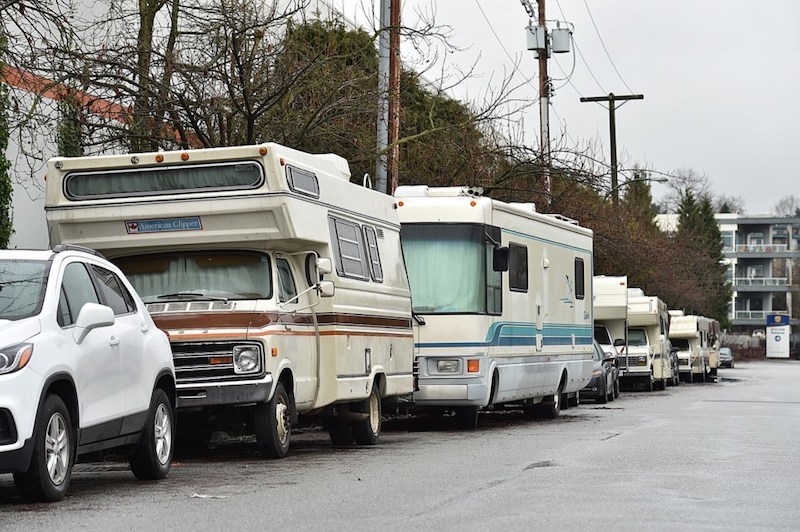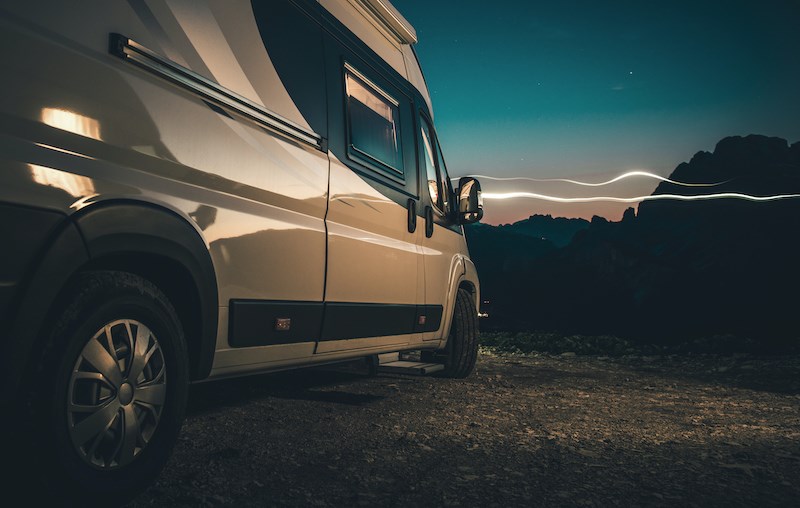After graduating from university, TikToker Leah Zecchino decided to leave her home province of Ontario to pursue a life of travel and tree planting in British Columbia. The then-22 year-old bought a 2005 Chevy Astro cargo van and spent months renovating it, which she documented on TikTok ().
“I started living in my van because of tree planting. It just seemed like an easy way to have everything accessible to me while living remotely and working remotely for three or four months a year.”
With the help of the internet and her dad, she was able to learn “the ins and outs” of everything that went into the van conversion, some troubleshooting methods in case her solar setup malfunctioned, and basic car mechanics.
Only love my bed and my mama I’m srry
When the tree planting season ended, she decided to continue the nomadic lifestyle. Zecchino, who resides in Campbell River, has been living in her van since March 2021. She says freedom was one factor in her decision to live in her van.
“Personally, for me being in school until I was 22 years old, for every single year of my life, I was really just looking for a way to be free and do whatever I wanted.”
Social media’s romanticized #vanlife
Vandwelling has been a nomadic lifestyle for many people before its popularity grew on social media. But in recent years, it has become a widely used hashtag, as more individuals began sharing their daily routines, tips and tricks with parking and general van conversion.
On TikTok, there are approximately 6 billion videos under #vanlife, in addition to content under different iterations like #vanliving, #vanlifer.
Many people who produce social media content about living in their vans are often 20-something to early 30-something year olds.
“It's so common in my age demographic because so many people are just so sick of everyone telling them what to do that they kind of romanticize this damn life as a way to escape from their own reality,” says Zecchino.
Although some content creators share the ups and downs of living in their vans, others portray a romanticized version, where they do yoga as the sunrises, or wake up to a space that looks like it came out of Architectural Digest.
“It's a running joke where everyone says, you know, #therealvanlife. It’s important to show people that it's still life. It's not perfect at all,” says Ola Kalejaye, co-founder and co-creative director at , an online platform that amplifies the nomadic experiences of BIPOC, LGBTQ+, and those with disabilities.
“You don't want to mislead people to think that they're going into this lifestyle, and it's just going to be one big Instagram highlight session.”
In addition to showing off an aesthetic nomadic lifestyle, many content creators are “young athletic, pretty white people,” says Kalejaye.
Historically, racialized people have been underrepresented in the outdoors as a whole, adds Kalejaye. “Like, ‘Black people don't go camping’ is a massive stereotype that has real historic basis in why that's the case or why that's perceived to be the case. So you end up with this super homogenous, whitewashed view of [vanlife].”
The lack of representation in this nomadic culture is one issue Diversity Vanlife works to highlight and address. They recently created a for racialized vandwellers by racialized vandwellers.
“It’s coming from a perspective where other BIPOC can look and see like, ‘OK, this actually does apply to me. Like, this hasn't been written, you know, in ignorance of my existence and the struggles that I particularly face.’”
#therealvanlife
While waking up to the sunrise and enjoying nature can be part of vandwelling, the lifestyle isn’t as glamourous as some content creators make it out to be.
For example, the van can break down.
“I actually did have a breakdown earlier in April where I had to get a tow. It was really stressful because I woke up and then my car wasn't starting. I was like, ‘What do I do now?’ But thank God I had service at the moment, and I wasn't that far off the grid,” remembers Zecchino.

Living in a van can also mean not having the convenience of a nearby washroom.
“If you don't have access to a toilet when you need to go, that kind of sucks. It’s not as easy. I mean, unless you have a toilet in your van or there's an outhouse that's nearby,” says Thomasina Pidgeon, a long-time vandweller in Squamish.
And for Pidgeon, these little changes or inconveniences are what social media fails to portray. In fact, Pidgeon argues the hashtag is inauthentic to the nomadic lifestyle.
“It’s strange to see people marketing a lifestyle, which is actually pretty pure and simple,” says Pidgeon. “When people market it like that to #vanlife, it ends up turning a minimalist lifestyle into a commodity, which really isn't what it's about. At least, for me.”
Most importantly though, finding places to park the van is crucial. Some vandwellers park their homes on . But not all city vandwellers want to park on campgrounds, or a 24-hour parking lot.
“They might want to be free on public land and enjoy public land and have that nomadic travel part of their lives, which to me is essential,” says Pidgeon.
But municipal bylaws, as well as stigma, can make parking a van in a city like Vancouver a challenge.
For example, the City of Â鶹´«Ã½Ó³» people with large vehicles like RVs to park on streets for three hours between 6 a.m. to 10 p.m. Overnight parking from 10 p.m. to 6 a.m. is not allowed unless the driver has a permit.
And in recent years, the City has been doubling down on RVs. They cite garbage and human waste as reasons to both enforce bylaws and evict vandwellers. And while these incidents may occur, Pidgeon argues that most vandwellers are respectful of their environment.
"Most of the people I know are pretty respectful and practice 'leave no trace.' I'm not saying that everyone is, but the people that are more experienced with vehicle living understand the rules and ethics and how to live in neighbourhoods in the right way. They know how to be discreet, respectful, and know what to not do,” adds Pidgeon.
It’s not about housing, it’s about choice
One reason why Zecchino decided to continue living in her van is because of the lack of affordable housing in British Columbia. Although Zecchino spent about $7,500 for her van and its conversion, she says it was a worthwhile investment.
“For the prices of living out here, I was looking at $900 to over $1000 a month for rent,” says Zecchino. “So just dividing the cost of my van by each month that I would be paying rent, it definitely made it worth it.”
According to Kalejaye, vandwelling can be economically empowering and provide financial freedom. He says that some of his friends have been able to pay off their student debt and consumer debt by living on the road.
“If you're able to knock out your rent and all these other, you know, unbelievable expenses that, like, take off most of your income,” he says.
And while for some vandwellers, housing costs might be a factor for this decision, Pidgeon says that for many people, this isn’t a housing issue. It’s about choice, and a different way of living that rebels against oppressive systems like capitalism and the legacy of colonialism.
“Why can't we decolonize housing? I think [some people] refuse to acknowledge that there are other people that want to live a different way than what they do. Consumption is killing us. We all don't need to live a certain way, or the same way, just to keep the system going.”






